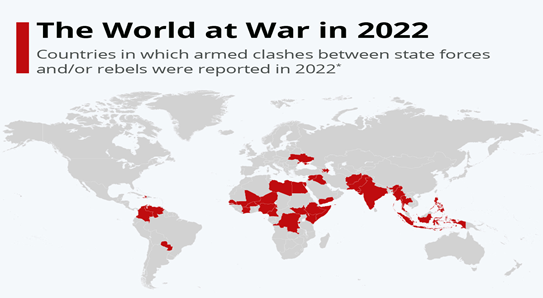

Context
In a recent address at the 90th Interpol General Assembly in New Delhi, the Home minister has mentioned the collective cooperation of members’ to ensure that the fight against terrorism is sustained, comprehensive and continuous, for which India is committed to working with the Interpol.
What is Terrorism?
- Terrorism, by definition, is always a crime, but it can also be a strategy in a war. In the international community (including UN), terrorism has no legally binding, criminal law definition.
- For the sake of discussion, it can be described as; according to the FBI: “Terrorism is the unlawful use of force or violence against persons or property to intimidate or coerce a government, the civilian population, or any segment thereof, in furtherance of political or social objectives.”
What are the causes of Terrorism?
- Political Terrorism: It was originally theorized in the context of insurgency and guerrilla warfare, a form of organized political violence by a non-state army or group.
- Strategic: Saying that a group has a strategic cause for using terrorism is another way of saying that terrorism isn't a random or crazy choice, but is chosen as a tactic in service of a larger goal. Terrorism is typically described as a strategy of the weak seeking to gain advantage against stronger armies or political powers.
- Religious: Religious ideas, such as martyrdom were seen as particularly dangerous. However, as thoughtful studies and commentators have repeatedly pointed out, such groups use selectively interpret and exploit religious concepts and texts to support terrorism. Religions themselves do not "cause" terrorism.
- Socio-Economic: Socio-economic explanations of terrorism suggest that various forms of deprivation drive people to terrorism, or that they are more susceptible to recruitment by organizations using terrorist tactics. Poverty, lack of education or lack of political freedom are a few examples.
What issues arises of Terrorism?
- Countering Terrorism can threaten the right to life of an individual.
- Challenges to the absolute prohibition against torture
- Transfer of individuals suspected of terrorist activity
- Liberty and security of the person is threatened
- Due process and the right to a fair trial of the suspects gets staked.
- Surveillance, data protection and the right to privacy is at risk due to terrorist activities.
How does it impact world’s global order?
- Mass destruction of assets and Infrastructure.
- Violation of Human rights and Communal disputes.
- Creates socio-economic divide in the society.
- Communal Targeting against suspects of terrorism.
- Making the region under-developed and poverty ridden.
- Polarisation of Youth mind-sets.

What are the fundamental challenges?
- Fast evolving of terrorism
- Lack of definition of the term terrorism
- Lack of mechanisms to list terror entities
- The ease with which Islamic State (IS) attracted recruits from around the world.
- The ease with which they travelled across borders to join the so-called caliphate in Syria and Iraq.
- Increasing potential use of 3-D printing, robotics, artificial intelligence (AI), machine learning, unmanned aerial systems, and synthetic biotech, for illegal ends.
Does it violate Human rights and up to what extent?
Yes, Terrorism does violate the Human rights in every form possible including the following aspects:
- It threatens the dignity and security of human beings everywhere, endangers or takes innocent lives, creates an environment that destroys the freedom from fear of the people, jeopardizes fundamental freedoms, and aims at the destruction of human rights.
- Has an adverse effect on the establishment of the rule of law, undermines pluralistic civil society, aims at the destruction of the democratic bases of society, and destabilizes legitimately constituted Governments.
- Has links with transnational organized crime, drug trafficking, money-laundering and trafficking in arms, as well as illegal transfers of nuclear, chemical and biological materials, and is linked to the consequent commission of serious crimes such as murder, extortion, kidnapping, assault, hostage-taking and robbery.
- Threatens the territorial integrity and security of States, constitutes a grave violation of the purpose and principles of the United Nations, is a threat to international peace and security, and must be suppressed as an essential element for the maintenance of international peace and security.
What are the Solutions to the issues related to Terrorism?
- The promotion and protection of human rights while countering terrorism: National counter-terrorism strategies should, above all, seek to prevent acts of terrorism, prosecute those responsible for such criminal acts, and promote and protect human rights and the rule of law.
- Government interventions with global cooperation.
- Establishing an international Law on terrorism and its related issues like Left wing- extremism, regional terrorism etc.
Conclusion:
Thus Terrorism can lead to several challenges and affects every section of the society irrespective of age, sex, region and religion. Hence there is a need to invoke a cooperative approach towards countering terrorism in every possible form.



